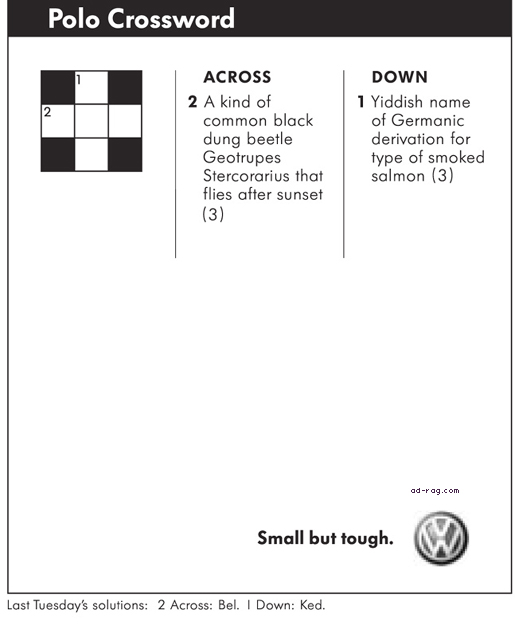how can you ever know the level of difficulty?
Here’s a comment from one of last week’s posts:
It got me thinking: was the brief easy?
No idea. I suppose the people involved would know, but even then there is a massive set of variables that alter enormously the degree to which a brief is or is not ‘easy’.
Let’s take the Last Minute ad as an example. The brief might have been, ‘Show how LastMinute.com is the best way to have a dirty weekend’, in which case the leap from brief to solution does not seem to be particularly large. But even then, you could answer that brief in many, many ways: are LM the kind of client that likes to push the boundaries and get a bit saucy, or are they quite staid, requiring a great effort from the agency to get them to buy edgy work? Is this indeed the ‘first thought possible’ or was it a desperate 2am solution after weeks of rejection? Was there even a brief? Was this in fact done on spec? Had it been sitting in a drawer for several years after being declined by twelve other clients? Was the initial solution more elaborate, only to be pegged back by a tiny budget and a minuscule lead time? Was the creative team a pair of wet-behind-the-ears newbies who needed a lot of support, or a pair of grizzled veterans who can turn this kind of stuff out in their sleep? Did the agency have to wait until the boring client was on holiday before slipping it through her more broadminded substitute?
Then again, the brief might have been, ‘Show how adults 24-35 could use LM.com as their primary resource for a city break’. Then the question of genesis gets trickier: did the creative team spot the potential diamond in the rough? Or was it the CD? The client? The planner? Did that take weeks, facing a great deal of resistance from various personnel who did not fancy a tough/embarrassing chat with their prudish client? Was this the umpteenth incredibly dull brief on the same subject, leaving all concerned immensely grateful to an inspired creative for finally pulling something funny out of the bag?
And those are just some of the questions that could have made this easier or harder. What about the mood the creative team was in? Was the AD going through a divorce? Had the copywriter just been turned down for a dream move to another agency?
Etc.
When I was judging the Press section of D&AD in 2005 we unanimously awarded the Silver to this campaign:
In a sea of turgid shite it made us laugh, and it was pretty unusual for a car ad.
Anyway, after the results were revealed someone from VW’s agency told me that the idea was basically handed to the team by the planner during the briefing, with the implication that the award shouldn’t really have been given for such an easily-reached solution. Well, none of the jury knew how hard it had been to come up with that campaign; we just saw it, liked it and awarded it.
So no one can ever truly know how tough a brief really is. Those 90″ Nike brand ads are probably just as tough to generate as a really good 25×4 ad for 15% off carrots at Tesco. Which is the harder brief? Fuck knows, and at the end of the day no one in the public gives a toss, so it’s best not to worry about it.


i know the hardest (and easiest) brief I ever faced.
The objective line read: CREATE THE MOST POPULAR ADVERTISING IN AMERICA.
The scary part was we all knew the Budweiser client really meant it. They had done great ads for decades.
So the ball was firmly in the creative’s court. Not having anyone to blame but yourself was new territory. winking smiley face.
Ben, allegedly, the brief was to get as much P.R. as you can for four figures. Tight bastards, eh.
So it was always going to be cock, balls and Vag.
They seem to have answered what I would consider a tough brief very well then.
4 figures? That is tight as a gnat’s chuff.
There are times when ‘in house’ production (cain&abel in this instance) serves a useful purpose.
Said through gritted teeth of course…
Hello, Ben
My question has nothing to do with this subject or maybe it has everything.
Have you wrote or read something profound on Mentorship recently?
I mean mentorship in advertising agency. I think it is a lost art. In our agency there was an influx of young people – and yes we gave them books, and films, and ads, and beautiful PDFs, we’ve made a score of trainings but probably that is not enough.
Thank you
I can’t promise it will be profound but I’ll have a think about about a post on that subject.
Thanks! It will be profound 🙂